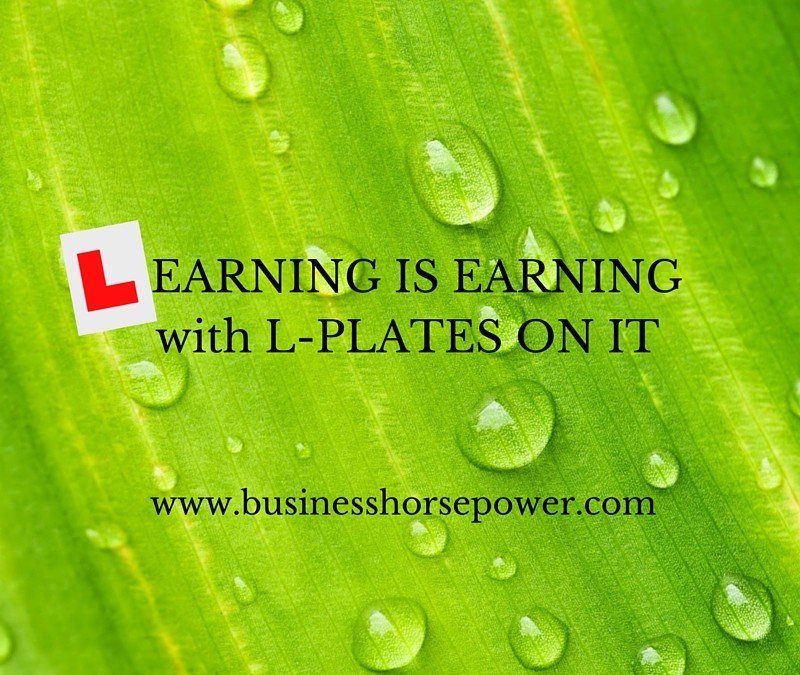
by Julia Felton | Mar 16, 2016
Today’s Wednesday Wisdom is inspired by the lions I saw in the African bush. Did you know that on average a pride of lions have only a 30% success rate every time they go for a kill? Do you think they complain and blame each other when they aren’t successful. No. They just try again.
What I have observed in business is that sometimes we don’t try. The fear of failure leaves us stuck and in paralysis. And yet often the thing that we crave is just round the corner, and if we dared maybe we might just be successful. Throughout my childhood I was typically reprimanded if I got things wrong so it is no wonder that as a business owner I have been afraid of failure and getting things wrong. Maybe you can relate to that. And yet the truth is we can never learn and develop if we don’t try new things. Sure we might fail at some of these new ventures, but so long as we have tried and take on board the learning there is no such thing as failure.
My mentor Roger Hamilton once shared this with me “Learning is earning with the L-plates on it” and it is so true. We can only learn by trying new things and as a business owner there is also the opportunity to be paid to do this. So if you are experimenting with something new in your business you can get paid whilst also learning at the same time.
For me only real source of failure in business (and in life) is if you fail to learn from your actions. Being a life long learner is imperative if you are to grow and stay successful because there is one certainty in business and that is change. The world is moving at lightening pace and unless we are open to learn new things then we will never stay competitive in business.
For the lions, and especially the young lion cubs, they learn to hunt and each time they are unsuccessful they keep trying again. After all their survival depends on mastering this skill. At the outset they are beginners but with continued practice they learn to hone their skills until they become very accomplished.
So my question today is what can you do that will develop your skills and provide you with learning opportunities, regardless of whether you succeed or fail. I’d love to hear from you.
Julia Felton (aka The Business Wrangler) is the founder of Business HorsePower. Business leaders, entrepreneurs and executives hire her to accelerate their business performance by harnessing the energy of their people to work more collaboratively together. By aligning purpose with actions the team achieves exponential results as everyone starts pulling in the same direction.
Julia believes that business is a force for good and through designing purpose-driven businesses that leverage the laws of nature, and the herd, you can create businesses founded on the principles of connection, collaboration and community that make a significant impact in the world.
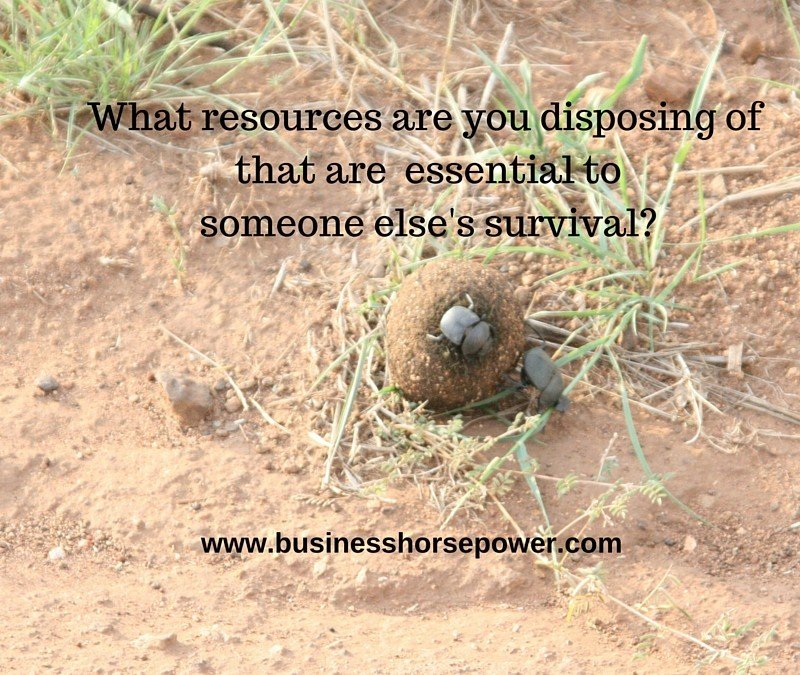
by Julia Felton | Mar 1, 2016
This weeks Wednesday Wisdom is all about the power of inter-dependence and how what one persons discards can be another persons treasure.
Out in the African bush I have seen all the Big Five – Cape Buffalo, Lion, Elephant, Rhino and Leopard – which has been amazing. What I love about the African bush – and in fact all nature – is that fact that every works in harmony. Nature is a true ecosystem where everything is inter-dependent on everything else. Consequently there is no wasted time, energy or money as everything is connected. This is the key theme of my new book The Alchemy of Change: The Key To The Future Lies In The Past
One of the interesting facts we learnt was that an elephant eats up to 300 kg per day, which means each elephant generates about 100kg of manure each and every day!!! That’s a lot of shit. And yet the elephant’s waste products are a source of sustenance for the Dung Beetle. Dung beetles collect up the elephant dung into a ball and then roll it to a destination where they bury it. They then climb into the ball of dung with their mate, reproduce and then the dung beetle lavae are born inside.
Just imagine what would happen if the dung beetles went on strike. The bush would become covered in elephant dung and the dung beetles would eventually die out but also all the grasslands that the dung is deposited on would wither away. This is such a classic example of how all the species within the bush are inter-dependent on each other for their survival.
And it’s the same in business too. Business is an ecosystem where everyone’s actions impact each other. And also one man’s trash is another man’s treasure.
What items are you discarding that could add real value to someone else? I’d be curious to hear.
Julia Felton (aka The Business Wrangler) is the founder of Business HorsePower. Business leaders, entrepreneurs and executives hire her to accelerate their business performance by harnessing the energy of their people to work more collaboratively together. By aligning purpose with actions the team achieves exponential results as everyone starts pulling in the same direction.
Julia believes that business is a force for good and through designing purpose-driven businesses that leverage the laws of nature, and the herd, you can create businesses founded on the principles of connection, collaboration and community that make a significant impact in the world.
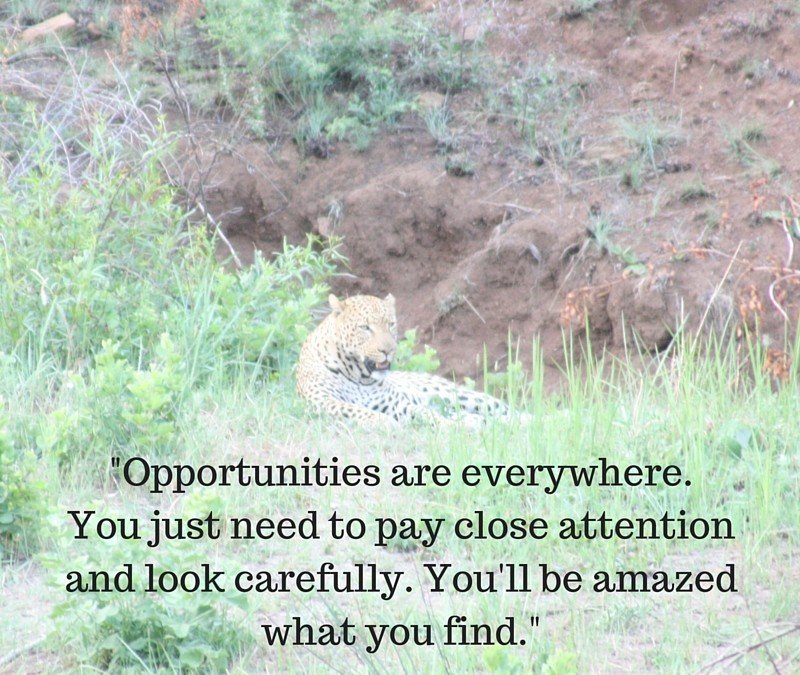
by Julia Felton | Feb 17, 2016
I’m sending you this weeks Wednesday Wisdom from the heart of the African Bush where I am co-running some events for Entrepreneurs Institute. Apologies for the delay but internet signal here is limited. This week’s insight is all about Opportunities because Opportunities are everywhere if we are just present and open to them.
I’ve now been in Africa for three days and done four game drives. What I have realised is that as each day goes by I become more grounded, present and aware. On the first day my focus was so narrow that I could barely see any animals, but as each day passes my periphery vision improves and now I’m starting to see animals that the Ranger hasn’t seen yet. Also on the first game drive I could only see big animals but this morning I started to notice all the butterflies and birds flying around.
You see the animals (aka opportunities) are all around us you just have to open your eyes to see them. Sometimes we are so focused on the big win, or the thing right in front of our nose, that we fail to see other opportunities lurking in the background. That is exactly what happened last night. We were so excited to see a Waterbuck, as we hadn’t seen one before, that we nearly missed seeing this leopard that was lying down in the undergrowth.
I wonder what opportunities are surrounding you that you are failing to see? So for today just slow down and stop, and really look around you. You might be amazed at what you are missing that is right beside you.
Julia Felton (aka The Business Wrangler) is the founder of Business HorsePower. Business leaders, entrepreneurs and executives hire her to accelerate their business performance by harnessing the energy of their people to work more collaboratively together. By aligning purpose with actions the team achieves exponential results as everyone starts pulling in the same direction.
Julia believes that business is a force for good and through designing purpose-driven businesses that leverage the laws of nature, and the herd, you can create businesses founded on the principles of connection, collaboration and community that make a significant impact in the world.
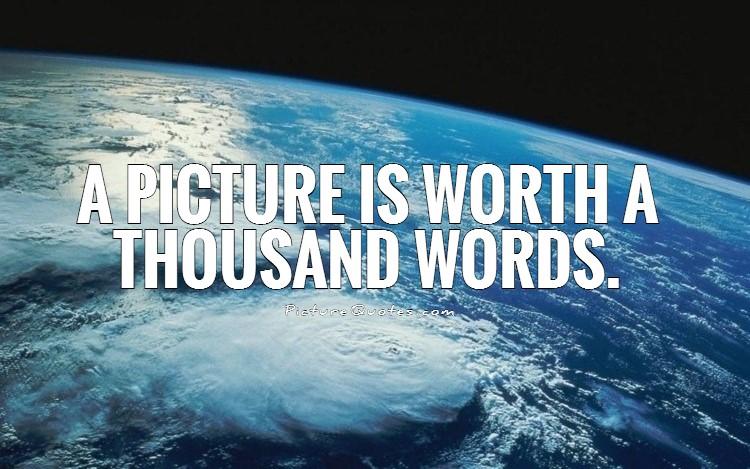
by Julia Felton | Feb 11, 2016
The adage goes that “a picture is worth a thousand words”, so therefore I’m curious to know what you think about this picture. What message do you think I was being sent when it arrived in my inbox? And how do you think I reacted?

We often totally under-estimate the power of non-verbal communication in our society and yet non-verbal communication is an essential component of everyday life. We can convey a simple or complex message very succinctly with how we show up.
If we are feeling bored and unenthusiastic at work our body posture will probably express this with folded arms, rounded shoulders and generally looking glum and sad. Contrast this with a team member who is happy and in flow enjoying their job. They probably have a spring in their step, are literally walking on air and have a happy countenance.
How we BE at work and in life shapes how people interact with us and therefore the experiences we have. Sure words are important, but only up to a point as research shows that our body language and tonality have a much greater impact on the impression we make than anything else.
So how do you think I responded when I received this. Well of course I laughed and immediately saw the funny side of how my actions were stopping one of my colleagues getting on with her work. What might have become a heated conversation – her chasing me for something I hadn’t completed – got deflected with with one simple image.
So how can you use non-verbal communication to convey your message in a fun and innovative way?. I’d love to hear what you are doing.
And of course if you want to learn non-verbal communication from horses, who are masters at this, then look out for my Art of Communication workshop that up soon. You can find all the details here.
Have an inspired rest of the week.
Julia Felton (aka The Business Wrangler) is the founder of Business HorsePower. Business leaders, entrepreneurs and executives hire her to accelerate their business performance by harnessing the energy of their people to work more collaboratively together. By aligning purpose with actions the team achieves exponential results as everyone starts pulling in the same direction.
Julia believes that business is a force for good and through designing purpose-driven businesses that leverage the laws of nature, and the herd, you can create businesses founded on the principles of connection, collaboration and community that make a significant impact in the world.
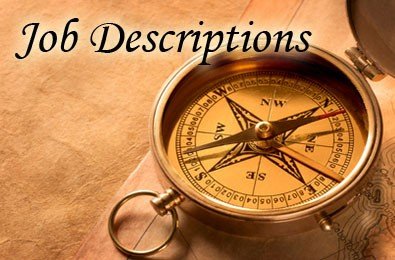
by Julia Felton | Feb 9, 2016
What if I told there are 8 different personality types and each profile has specific strengths they can bring to your business? Would you put people in the right roles for their profile.? I bet you would because that would bring massive efficiencies in the business and make productivity and profitability increase.
So why is it that time and time again I come across people working in the wrong roles – ones that don’t utilize their strengths – or where they can’t add real value to the team?
One of the reasons for this is that in my opinion most job descriptions are fundamentally flawed. We want team members to undertake a myriad of tasks that are diametrically opposed and require very differing skills sets.
Talent Dynamics is a business development tool that identifies that within everyone there are four different frequencies and each person has a preference for one type of frequency. Maybe you are a:
- Dynamo: energized, dynamic and great at getting things started. Getting things finished can be a challenge
- Blaze: passionate, outgoing, great at networking and meeting new people. Easily distracted by the task at hand
- Tempo: compassionate, great team player and reliable at getting things done with the team. Other seeks direction from others
- Steel: orderly, systems orientated with a good eye for detail, strong at completing. Can find it difficult to start new things.
Given our redisposition towards one of these frequencies can you now see how a job description that requires someone to create the strategy and have a big picture perspective (dynamo energy) will struggle with customer follow up and attention to detail (much more a tempo/steel activity).
Let me give you an example of a job description for a secretary that I have just pulled from the web. Look at all the different types of frequencies that the role requires.
- devising and maintaining office systems; (dynamo)
- booking rooms and conference facilities; (tempo)
- using content management systems to maintain and update websites and internal databases; (steel)
- attending meetings, taking minutes and keeping notes; (tempo)
- managing and maintaining budgets, as well as invoicing; (steel)
- liaising with staff in other departments and with external contacts; (blaze)
- liaising with colleagues and external contacts to book travel and accommodation; (tempo)
- organising and storing paperwork, documents and computer-based information; (dynamo)
- recruiting, training and supervising junior staff and delegating work as required; (blaze)
- manipulating statistical data; (steel)
Wow, not only is that a lot to cover but it requires someone with super human powers as it is simply impossible for someone to have strengths in all these areas.
When we ask team members to work across the different frequencies it is challenging for them and they certainly don’t deliver the most value to the business. Often they end up stressed doing the parts of the role that don’t resonate with them, or in the worst cases they don’t do this part of the role at all.
I remember when I was leading teams in the corporate world how at every staff appraisal I used to get team members to focus on developing the areas they were weakest at. This was before I had been exposed to Talent Dynamics. I now realize that if my data manager (who had a lot of Blaze energy) had been allowed to shine by engaging and motivating my team members how much more valuable she would have been to the team than left analyzing data which is a very steel type activity (and one she hated and to be fair wasn’t that great at).
And with my own role I loved it to begin with creating a new department and designing a new innovative product. My dynamo energy was ignited and I was on fire creating a pioneering solution for the hospitality industry. Contrast that with later in my career when I had grown the business to be the global market leader in its niche. My role changed and instead of creating new solutions I was charged with managing the team – a real blaze role – and one that I did not relish. My value to the company diminished as I was not fulfilling my potential since I wasn’t doing what I was naturally gifted to do.
I hope you now see how often we design roles for people that they can never really succeed at. A better approach would be to ensure that you have a number of different roles in the team that cover all the different frequencies. And ensure that people are working in the roles that best resonate with their natural strengths.
Also, beware of always hiring people like you as you will just get more of the same and the tasks that you don’t like doing still won’t get done as they are not the natural skill sets of the person you hired. This is exactly what I experienced recently working with a client in the media sector. All the people in the team were super creative types with lots of dynamo and blaze energy and there was very little steel and temp energy in the group. The result was that the team weren’t good at managing the finances of the group or mastering follow up.
Just like a wheel of life there needs to be a balance of these different energies in your business. Have a look at your business now and the roles that you have identified for your team members. Do they need refining to better use each individuals skills?
To find out how you can use Talent Dynamics to help you rewrite your job descriptions or help you identify the roles that speak to your natural strengths please feel free to connect with me at Julia@businesshorsepower.com.
Julia Felton (aka The Business Wrangler) is the founder of Business HorsePower. Business leaders, entrepreneurs and executives hire her to accelerate their business performance by harnessing the energy of their people to work more collaboratively together. By aligning purpose with actions the team achieves exponential results as everyone starts pulling in the same direction.
Julia believes that business is a force for good and through designing purpose-driven businesses that leverage the laws of nature, and the herd, you can create businesses founded on the principles of connection, collaboration and community that make a significant impact in the world.
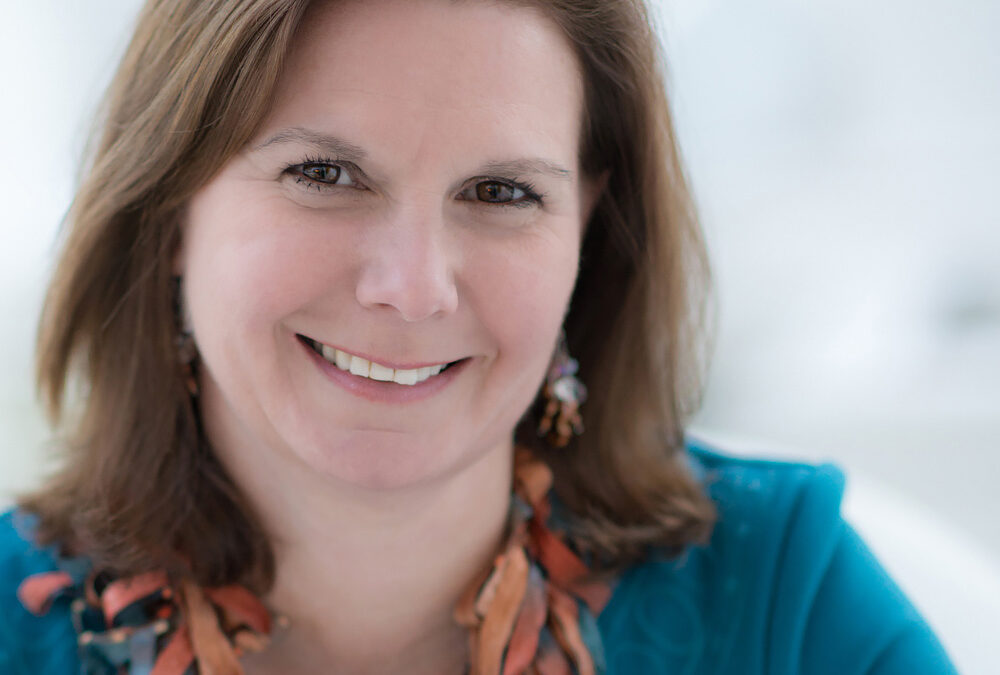
by Julia Felton | Feb 3, 2016
In today’s Wednesday Wisdom I want to talk about decision making. I’m sure you made some pretty clear decisions at the end of last year about how you wanted 2016 to play out. I bet you probably reflected on these for many hours and days, but have you ever stopped to consider what impact the many trivial decisions we are making on a daily basis have on your success.
Did you know that in a 2011 study by K. Douglas reported in the New Scientist revealed that we make 10,000 trivial decisions every day. Often these decisions are so trivial that we don’t fully think about their consequences, but over time a number of these trivial decisions can magnify to have a great impact on our lives.
As a business owner it is easy to get sucked into the vortex of buying new pieces of software to help your business. I recently reviewed all the different pieces of software I had and was shocked to find it totaled close to £1,000 – a CRM subscription, Vimeo Plus, Amazon S3, Roboform, Google Apps for business, Echosign, Abobe pdf converter, web hosting fees to name but a few, and don’t get me started on the number of domain names I own. You see individually these were all trivial decisions – USD30-50 – but you see how over time they have accumulated and now have a dramatic impact on the profitability of my business.
And its the same in life too. It is the small decisions that really shape what happens our life. Should I work out today? Should I eat this bar of chocolate? Each decision in itself is not critical but over time they mount up and my poor decisions, over the last 18 months, around eating chocolate bars has resulted in me gaining a dress size. Ouch!
So my challenge to you today is to think more consciously about your decisions and reflect on what longer term impact they will have. You see everything in life is inter-connected so what happens is a ripple effect. Its the law of cause and effect.
As always I’d love to hear about your trivial decisions and the impact they have had. You can connect to me on my facebook page.
Have an inspired rest of the week.
Julia Felton (aka The Business Wrangler) is the founder of Business HorsePower. Business leaders, entrepreneurs and executives hire her to accelerate their business performance by harnessing the energy of their people to work more collaboratively together. By aligning purpose with actions the team achieves exponential results as everyone starts pulling in the same direction.
Julia believes that business is a force for good and through designing purpose-driven businesses that leverage the laws of nature, and the herd, you can create businesses founded on the principles of connection, collaboration and community that make a significant impact in the world.
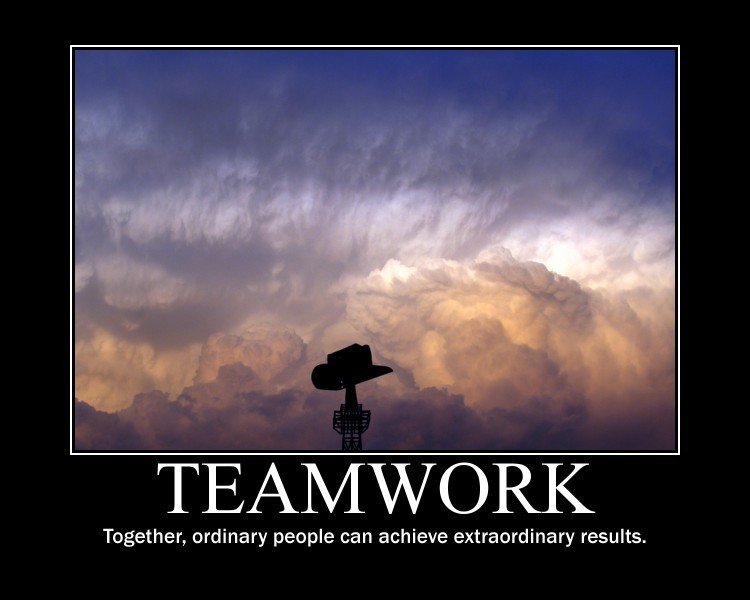
by Julia Felton | Jan 31, 2016
When you are building your team it is essential that you find the right person for the role. I know given the tough economic conditions we’ve been through recently that it is tempting for a candidate to apply for any job for and for the business owner who needs to find resource to accept a less and ideal candidate
Stop. This is such a flawed strategy for both parties and ultimately ends up costing everyone valuable time, energy and money as:
- The applicant ultimately won’t enjoy the job. Sure they might be able to do the role, but are they giving 110% to it. If the role is not aligned to their own passion and purpose they simply won’t be as productive or creative in the role as they could be.
- For the employer they are not utilizing the employees best strengths and so ultimately the productivity and engagement of the team member declines and the net result is less profitability for the business.
What both parties crave for is a situation where the team member is working to their strengths, and delivering massive value to the business . This occurs when the team member is in a state we call flow. Put simply, flow is the path of least resistance. When team members are in flow, productivity rises, results increase, occurrences line up, everyone has more fun and feels more connected to the organisation and it’s goals.
When a team member is in flow they feel energised, focused and fully engaged in the task at hand. Often there can be a distortion of time as their internal clock does not seem to match the external clock – perhaps you have experienced this when you have been doing something you love and time just literally seems to fly by. That’s a time that you were in flow.
So how do you know if you are in flow:
- If you are feeling stressed, overwhelmed or anxious, then it’s a fairly good indicator you are out of Flow.
- The opposite is true when you are in Flow, you feel joy and even rapture whilst performing the task. In the work place, this results in a harmonious environment.
The challenge I come across time and time again are team members that are in the wrong roles. They are not playing to their strengths and as a result the are sabotaging the success of the business. This is not usually intentional it is just that unless you are in flow you are unlikely to be able to access the hidden 90% of your potential that exists.
Imagine the benefits if all your team members were operating at or above their peak performance level. Imagine what an impact that would have both on the motivation of the employee but also on the organizational results. Customers would feel more cared for, projects would get delivered on time and the harmony in the workplace would be infectious. This is the type of workplace where trust pervades as everyone is doing their role to their very best.
One tool that I use to help my clients and their business get into flow is something called Talent Dynamics. Based on an ancient Chinese philosophy, the I Ching, it allows each person in a team or organisation to understand the quickest and easiest way for them to get into and stay in Flow by working with their strengths. It also helps them understand where they are most able to add value to the organisation. Simply, by understanding the value you contribute to a team, then you can immediately help identify potential Business Development opportunities.
If you are leading a team then I highly recommend profiling your entire team so you can create mutual understanding and get the whole team into flow. Understanding the strengths of team mates and how they contribute and add value to the business allows you to better communicate and it is easier to gain trust and respect with each other and so deliver results in performance and profitability.
So whether you’re a potential employee or a business owner looking to expand your team make sure that you find the perfect person for – one that speaks to their strengths and where they can add real value.
The first step to finding out your strengths is to identify where you are most trusted in business. You can take the quick 2 minute assessment at http://bit.ly/trusttest.
Julia Felton (aka The Business Wrangler) is the founder of Business HorsePower. Business leaders, entrepreneurs and executives hire her to accelerate their business performance by harnessing the energy of their people to work more collaboratively together. By aligning purpose with actions the team achieves exponential results as everyone starts pulling in the same direction.
Julia believes that business is a force for good and through designing purpose-driven businesses that leverage the laws of nature, and the herd, you can create businesses founded on the principles of connection, collaboration and community that make a significant impact in the world.
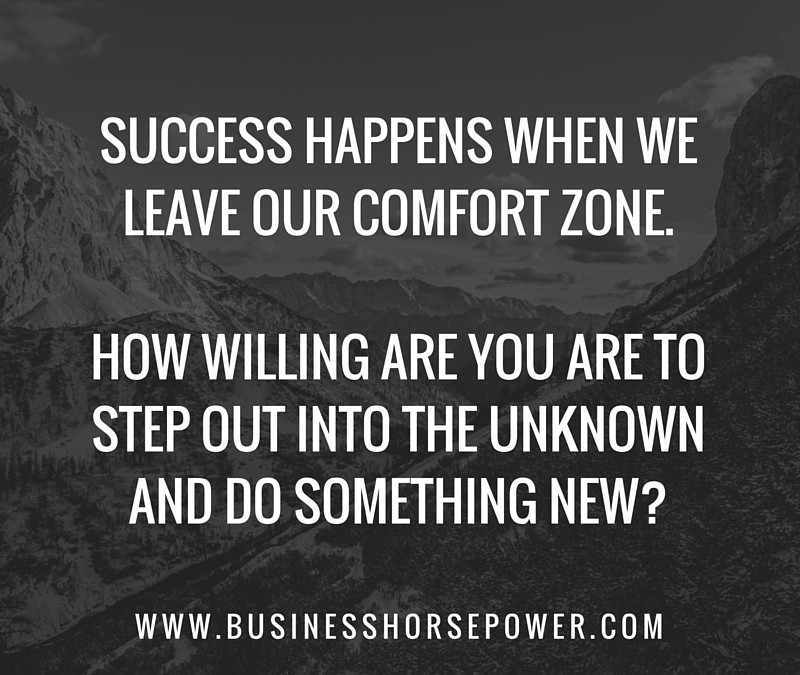
by Julia Felton | Jan 27, 2016
One of the things I always challenge my clients to do is to step out of their comfort zone and try something new. For many people just coming to an experience with the horses is the start of that stretch. In fact sometimes just the mere thought of doing this can send people into a tail spin.
That was certainly the experience of some of our clients earlier this month. As soon as they learnt that the next module of their leadership programme was with horses all kinds of doubts and fears set in. To the extent that three people actually cancelled their attendance at the event.
It always surprises me the reaction of people to the leadership work with horses. Some totally embrace it and see the experience as a stretch and to try something new outside their comfort zone, whilst for others it puts them into a state of fear and panic.
The one thing that I do know from personal experience is that unless we challenge ourselves to do something new, we never grow and develop. We never expand and change.
Now I also appreciate that everyone’s comfort zone is different and as a skilled facilitator we need to manage the experience and so not take people into a place of paralysis and fear, but rather move them forward step by step so that their own personal comfort zone expands. Because ironically what happens is that if we don’t stretch and challenge ourselves our comfort zone becomes smaller and smaller.
Last night I stretched myself ou of my comfort zone by holding my book launch at the Institute Of Directors in London. I would describe myself as a pretty accomplished speaker but to be honest I have always spoken supported by a powerpoint presentation. Last night no powerpoint was allowed. When I first heard this I was afraid that I wouldn’t know what to say and momentarily thought about pulling out. But I didn’t. I “pulled on my big girl panties” and stepped into the spotlight. And you know what. With no notes to distract me I got really connected to my audience and delivered one of the best talks I have done in long time.
I am now so grateful for that experience as it has helped me prove to myself that I do not need the crutch of a powerpoint presentation to deliver compelling and inspiring content.
So what are you going to do today to step out of your comfort zone and do something different?. I’d love to hear about it on the facebook group.
Have an inspired rest of the week.
Julia Felton (aka The Business Wrangler) is the founder of Business HorsePower. Business leaders, entrepreneurs and executives hire her to accelerate their business performance by harnessing the energy of their people to work more collaboratively together. By aligning purpose with actions the team achieves exponential results as everyone starts pulling in the same direction.
Julia believes that business is a force for good and through designing purpose-driven businesses that leverage the laws of nature, and the herd, you can create businesses founded on the principles of connection, collaboration and community that make a significant impact in the world.

by Julia Felton | Jan 16, 2016
When I’m often speaking with my clients I hear the words “FAILURE IS NOT AN OPTION” and whilst I can concur with this principle what often gets overlooked is the fact that it is failure that leads to success. Whilst an overall intention would be for the business not to fail, the reality is that along the way there will be lots of failures – or as I prefer to call them opportunities to learn. There is nothing wrong with failure so long as the learning is taken and applied and the same error is not repeated again. Thomas Edison could have had 1,000 failures before he created the light bulb whereas he choose to re-frame that as 1,000 opportunities to learn what doesn’t work so that he could improve on this next time.
“Failure provides the opportunity to begin again, more intelligently.” ~ Henry Ford
One of the challenges in business is many business cultures do not activity support the concept of failure, aka opportunities to learn, and when team members mistakenly think they they cannot fail it stifles creativity and innovation and this can lead to the business becoming stagnant and unresponsive to changes in the competitive landscape.
Recently I have been working with a group of elite leaders, who coming from the world of sport, more than others, really believe that failure is not an option and that winning is the only imperative. The challenge is that this attitude has been affecting the culture of the business and so has been hampering the innovation and creativity in their business.
The harsh fact is that businesses often fail because they don’t have a high enough degree of innovation, co-operation and collaboration. Inevitably, a competitor comes along with a superior teamwork, co-operation, collaboration and inter-dependency and eventually the less effective business is unable to compete. Take Southwest Airlines as an example. They used to be a small, inconsequential airline operator and yet today, through taking an innovative approach to their business, they have now become one of the most profitable and valuable airlines in the United States.
For business to be successful in the 21st century it is imperative that it fosters an entrepreneurial spirit amongst team members. Long term, sustainable competitive advantage is achieved through out-innovating the competition in ways that enhance efficiency and create greater value for customers. To achieve this, team members need to be unleashed and allowed to tap into their own genius. Imagine the impact if every single person working for a company were able to create and innovate. Imagine how much more intellectual capital would be available to the business, as each person would be accessing their full potential, making a real contribution and be in Flow. It would be a win-win situation for everyone.
Contrast this with the traditional control and command structures where the message to team members is typically something like, “We don’t pay you to think: we just pay you to do your job”. As a result, great opportunities to be creative and innovative are lost because the team members interfacing with the customers do not feel empowered to make decisions and challenge the status quo. Ironically, the one thing that the command and control structure seeks to achieve in fact hampers business growth as resources are not optimised and business opportunities are wasted.
Whole Foods is a great example of a company that has managed to empower their team members by creating a workplace based on love and care and that is also fun, where team members aren’t afraid and collaboration reigns. It is this release of creativity and innovation that has enabled the company to improve and evolve rapidly.
Without a collaborative culture, this innovation and creativity would have been of limited value. It is no good for one business unit to come up with a great idea and then not share it with the rest of their colleagues. A culture of collaboration enables successful ideas and innovations to be shared and spread rapidly throughout the business. The great thing is that technology can help rapidly disseminate information so new ideas can be almost instantly put into action. With even more Big Data metrics than ever before, businesses can effectively monitor and track how these new initiatives are impacting business performance.
This continual review process creates the opportunity for continual learning and improvement within the business. In this set up, business truly becomes a living system that learns, grows, evolves, self-organises – and even self-actualises – on its own. The right degree of decentralisation, empowerment, love and care in the workplace enables business to adapt, innovate and evolve faster enabling them to enjoy strong, sustainable competitive advantage.
So how are you creating a culture of innovation and creativity within your business? What systems and processes do you have in place to finely manage the balance of innovation with the need for some structure? Are you business leaders demonstrating and role modelling what innovation looks like? What are the consequences of not failing to encourage failure?
If you’d like to learn more about how to create a create a culture of innovation and collaboration then you might enjoy reading The Alchemy of Change: Ancient Wisdom Reinvented to Unleash The Hidden Potential of Leaders and Teams
Julia Felton (aka The Business Wrangler) is the founder of Business HorsePower. Business leaders, entrepreneurs and executives hire her to accelerate their business performance by harnessing the energy of their people to work more collaboratively together. By aligning purpose with actions the team achieves exponential results as everyone starts pulling in the same direction.
Julia believes that business is a force for good and through designing purpose-driven businesses that leverage the laws of nature, and the herd, you can create businesses founded on the principles of connection, collaboration and community that make a significant impact in the world.
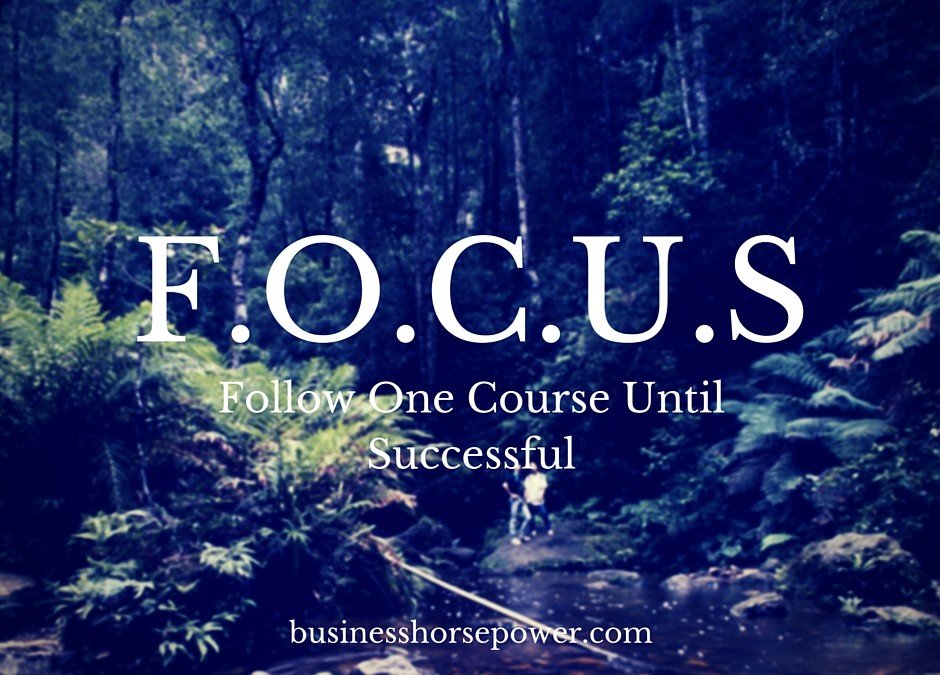
by Julia Felton | Jan 13, 2016
So how are your New Years resolutions going? Are you giving them the focus they deserve? If not the reason might be that they are not important enough to you, or else you have too many other things going on.
Todays Wednesday Wisdom has been inspired by by own situation over the last few weeks. As some of you know I made a commitment to start running in November and yesterday, 8 weeks later, I have just run, for the first time in my life, 5km. It felt amazing.
What I’ve realised about my approach to running is that I have been disciplined and focused. I even went out on Christmas Day!. I could have never even have conceived that running 5km would even be possible but with regular practice I am moving forward to achieve my goal of completing 10km.
And in business too, you need to ensure you just FOCUS on one thing at a time. I love the acronym for FOCUS which is Follow One Course Until Successful. So this is my mantra for this year. Choose one thing and stick to it, because by taking small steps everyday the impossible can start to become a reality.
What are you choosing to focus on today?
Julia Felton (aka The Business Wrangler) is the founder of Business HorsePower. Business leaders, entrepreneurs and executives hire her to accelerate their business performance by harnessing the energy of their people to work more collaboratively together. By aligning purpose with actions the team achieves exponential results as everyone starts pulling in the same direction.
Julia believes that business is a force for good and through designing purpose-driven businesses that leverage the laws of nature, and the herd, you can create businesses founded on the principles of connection, collaboration and community that make a significant impact in the world.
















